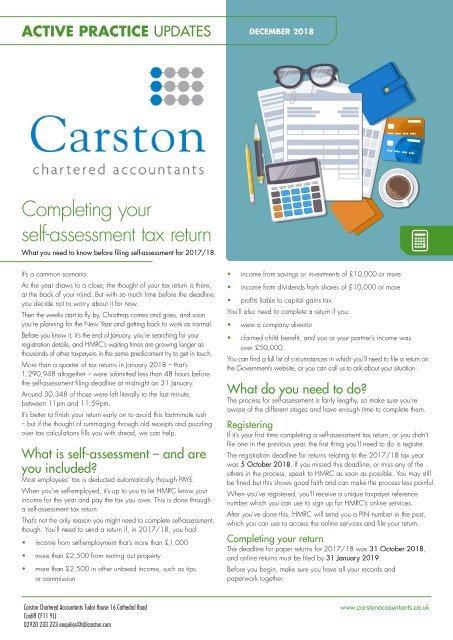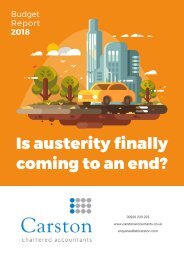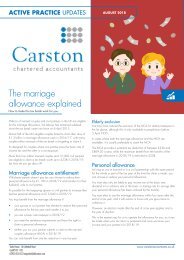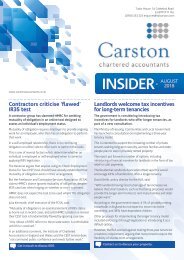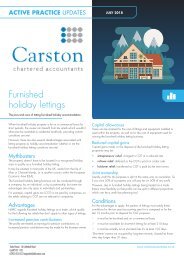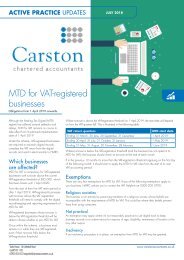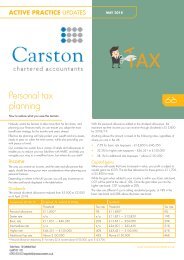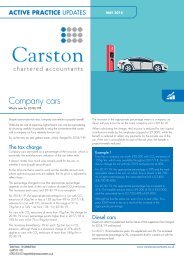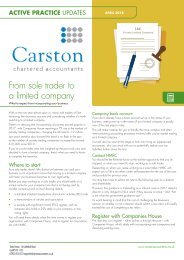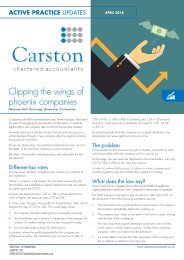CarstonPWP_APU_Dec18_completing-self-assessment
You also want an ePaper? Increase the reach of your titles
YUMPU automatically turns print PDFs into web optimized ePapers that Google loves.
ACTIVE PRACTICE UPDATES DECEMBER 2018<br />
Completing your<br />
<strong>self</strong>-<strong>assessment</strong> tax return<br />
What you need to know before iling <strong>self</strong>-<strong>assessment</strong> for 2017/18.<br />
It’s a common scenario.<br />
As the year draws to a close, the thought of your tax return is there,<br />
at the back of your mind. But with so much time before the deadline,<br />
you decide not to worry about it for now.<br />
Then the weeks start to ly by, Christmas comes and goes, and soon<br />
you’re planning for the New Year and getting back to work as normal.<br />
Before you know it, it’s the end of January, you’re searching for your<br />
registration details, and HMRC’s waiting times are growing longer as<br />
thousands of other taxpayers in the same predicament try to get in touch.<br />
More than a quarter of tax returns in January 2018 – that’s<br />
1,290,948 altogether – were submitted less than 48 hours before<br />
the <strong>self</strong>-<strong>assessment</strong> iling deadline at midnight on 31 January.<br />
Around 30,348 of those were left literally to the last minute,<br />
between 11pm and 11:59pm.<br />
It’s better to inish your return early on to avoid this last-minute rush<br />
– but if the thought of rummaging through old receipts and puzzling<br />
over tax calculations ills you with dread, we can help.<br />
What is <strong>self</strong>-<strong>assessment</strong> – and are<br />
you included?<br />
Most employees’ tax is deducted automatically through PAYE.<br />
When you’re <strong>self</strong>-employed, it’s up to you to let HMRC know your<br />
income for the year and pay the tax you owe. This is done through<br />
a <strong>self</strong>-<strong>assessment</strong> tax return.<br />
That’s not the only reason you might need to complete <strong>self</strong>-<strong>assessment</strong>,<br />
though. You’ll need to send a return if, in 2017/18, you had:<br />
• income from <strong>self</strong>-employment that’s more than £1,000<br />
• more than £2,500 from renting out property<br />
• more than £2,500 in other untaxed income, such as tips<br />
or commission<br />
• income from savings or investments of £10,000 or more<br />
• income from dividends from shares of £10,000 or more<br />
• proits liable to capital gains tax.<br />
You’ll also need to complete a return if you:<br />
• were a company director<br />
• claimed child beneit, and you or your partner’s income was<br />
over £50,000.<br />
You can ind a full list of circumstances in which you’ll need to ile a return on<br />
the Government’s website, or you can call us to ask about your situation.<br />
What do you need to do?<br />
The process for <strong>self</strong>-<strong>assessment</strong> is fairly lengthy, so make sure you’re<br />
aware of the different stages and have enough time to complete them.<br />
Registering<br />
If it’s your irst time <strong>completing</strong> a <strong>self</strong>-<strong>assessment</strong> tax return, or you didn’t<br />
ile one in the previous year, the irst thing you’ll need to do is register.<br />
The registration deadline for returns relating to the 2017/18 tax year<br />
was 5 October 2018. If you missed this deadline, or miss any of the<br />
others in the process, speak to HMRC as soon as possible. You may still<br />
be ined but this shows good faith and can make the process less painful.<br />
When you’ve registered, you’ll receive a unique taxpayer reference<br />
number which you can use to sign up for HMRC’s online services.<br />
After you’ve done this, HMRC will send you a PIN number in the post,<br />
which you can use to access the online services and ile your return.<br />
Completing your return<br />
The deadline for paper returns for 2017/18 was 31 October 2018,<br />
and online returns must be iled by 31 January 2019.<br />
Before you begin, make sure you have all your records and<br />
paperwork together.<br />
Carston Chartered Accountants Tudor House 16 Cathedral Road<br />
Cardiff CF11 9LJ<br />
02920 233 223 enquiries@sblcarston.com<br />
www.carstonaccountants.co.uk
Completing your <strong>self</strong>-<strong>assessment</strong> tax return<br />
If you’re registered as <strong>self</strong>-employed, you’ll need the following records:<br />
• all your business expenses<br />
• records of any sales or income<br />
• PAYE records (if applicable)<br />
• VAT records (if registered)<br />
• records of your personal income.<br />
If you’re employed or a company director for a limited company, you<br />
may also need:<br />
• P45, P60 and P11D forms<br />
• certiicates from a taxed award scheme<br />
• information about any redundancy or termination payments<br />
• information about income and beneits from your job.<br />
Paying your bill<br />
This will include any tax you owe for the 2017/18 tax year, as well<br />
as your irst payment on account towards the 2018/19 tax year.<br />
The deadline for paying it is the same as that for iling the return, by<br />
midnight on 31 January 2019.<br />
What are the penalties if it’s late?<br />
There’s an initial £100 penalty if your return is up to three months late,<br />
but this could increase the longer you leave it.<br />
After three months, there are additional daily penalties of £10 per<br />
day, up to a maximum of £900.<br />
Then, after six months, you could end up with a further penalty of<br />
5% of the tax due or £300 – whichever is greater.<br />
After 12 months, there’s another 5% or £300 charge, which will<br />
again depend on whichever is greater.<br />
If you pay your tax bill late, you could face additional penalties of<br />
5% of the tax unpaid at 30 days, six months and 12 months.<br />
You can appeal against a penalty if you have a reasonable excuse,<br />
but the conditions for this are limited. Circumstances for appeal<br />
could include:<br />
• if a partner or close relative has passed away prior to the<br />
deadline<br />
• serious illness<br />
• an emergency hospital stay<br />
• unexpected delays in the post<br />
• an IT failure (hardware or software) when preparing your<br />
tax return<br />
• external causes (ire, lood or theft) which prevented you from<br />
<strong>completing</strong> a return<br />
• issues with HMRC services.<br />
Common problems<br />
When you’re iling your <strong>self</strong>-<strong>assessment</strong> return, it’s best to get it right the<br />
irst time so you don’t have to worry once the deadline has passed.<br />
Here are some of the most common mistakes, and how you can<br />
avoid them.<br />
Missing out on tax relief<br />
While <strong>self</strong>-<strong>assessment</strong> seems focused on calculating the tax you owe,<br />
you might forget about what you can claim back.<br />
Remember to claim back tax relief where you’re eligible for it,<br />
including on charitable donations you’ve made, pension contributions,<br />
or work expenses.<br />
Not declaring all your income<br />
All your taxable income needs to be declared on your<br />
<strong>self</strong>-<strong>assessment</strong> form.<br />
That includes earnings, dividends, pension payments, interest on your<br />
bank account, capital gains and rent from a buy-to-let property.<br />
It can be especially easy to miss something out if your inancial<br />
situation is complex, so give some extra thought to this section to make<br />
sure you’ve included all your income.<br />
Late or inaccurate iling<br />
HMRC statistics show that around 745,588 returns were iled late for<br />
the 2016/17 tax year. To make sure you’re not one of the culprits this<br />
year, make sure you start well in advance.<br />
Rushing through the form can also increase the risk that you’ll ill in the<br />
wrong numbers.<br />
Think carefully about the information as you ill it in, and double check<br />
your calculations before you submit the form.<br />
If you do realise you’ve made a mistake, you can amend your tax<br />
return within the irst year of the 31 January deadline.<br />
You may still face a penalty for this if HMRC decides you have not<br />
taken reasonable care to provide the right information.<br />
Alternatively, to avoid any of these problems from the start, we<br />
can handle your <strong>self</strong>-<strong>assessment</strong> tax return and ensure it’s completed<br />
accurately and on time.<br />
Deadlines<br />
To recap, here are the four main deadlines to keep in mind when<br />
you’re <strong>completing</strong> <strong>self</strong>-<strong>assessment</strong>:<br />
Task<br />
Registering<br />
Submitting paper tax return<br />
Submitting online tax return<br />
Paying tax<br />
Contact us for help with <strong>self</strong>-<strong>assessment</strong>.<br />
Deadline<br />
5 October<br />
31 October (midnight)<br />
31 January (midnight)<br />
31 January (midnight)


